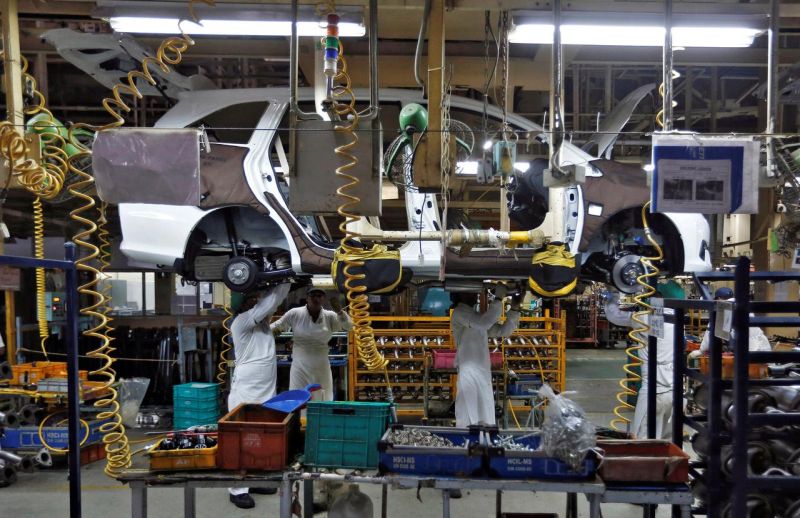More steps, time needed for auto sector revival

Employees work at the production line on a Honda Mobilio car at a Honda plant in Greater Noida on the outskirts of New Delhi on July 21, 2014. (REUTERS File Photo)
New Delhi/Mumbai, September 15 (IANS): With automobile industry’s August sales touching the lowest level since 1997-98, industry insiders assert that the time is ripe for the government to take other steps to save as many as million contractual jobs which depend on this sector.
Nonetheless, the earlier announced measures are likely to weaken the slowdown, however, it is expected to persist in the coming quarters.
“Since the liquidity issue has been resolved to an extent, other pain points, especially the tax element and a scrappage policy, need to be addressed. There are indications that the government is looking at them seriously,” Grant Thornton India LLP Partner, Sridhar V. told IANS.
“Some more time is needed to see the real impact of the previously announced measures.”
Last month, Finance Minister Nirmala Sitharaman announced several measures to rescue the auto sector, including lifting a ban on purchase of vehicles by government departments, and allowing additional 15 per cent depreciation on vehicles bought till March 2020 among others.
However, the industry has demanded more measures, like reduction in the Goods and Services Tax (GST) from 28 per cent to 18 per cent on automobiles along with a vehicle scrappage policy.
According to Kavan Mukhtyar, Partner and Leader - Automotive, PwC India, a GST rate cut on small car for limited period can trigger demand, as well as, a scrappage policy for commercial vehicles.
In recent days, many government ministers have assured the industry that taxation demands will be put forth to the GST Council, while an accelerated thrust for infrastructure creation will lead to demand for commercial vehicles.
Earlier this month, Union Minister Nitin Gadkari disclosed that government is expected to award 68 projects worth Rs 5 lakh crore in the coming months, which include expressway development. These new infrastructure projects are expected to generate demand for automobile construction equipment.
In addition, Minister of State for Finance and Corporate Affairs Anurag Thakur has asked the industry players to reach out to State Finance Ministers as the decision on any change in GST can only be taken by the GST Council.
The council’s next meeting is scheduled in Goa on September 20.
Presently, the sector has been dented hard by a consumption slowdown which is considered to be a culmination of several factors like high GST rates, farm distress, stagnant wages and liquidity constraints.
Besides, inventory pile-up at the dealerships and stock management of unsold BS-IV vehicles have become a problem for the sector.
Recently, all major OEMs consisting of passenger, commercial, two- and three-wheeler manufacturers have reported a massive decline in domestic sales.
As per Society of Indian Automobile Manufacturers’ August sales figures, the overall sectoral offtake in the domestic market has plunged 23.55 per cent.
This level of downturn was witnessed only once earlier, in December 2000, when the de-growth was registered at 21.81 per cent. The available data series commences from 1997-98.
Accordingly, total sales of the Indian automobile sector declined to 1,821,490 units, from 2,382,436 units sold during the corresponding month of the previous year.
Significantly, passenger car sales plunged by 41.09 per cent to 115,957 units, against 196,847 units sold in August 2018.
In the commercial vehicle segment, sales were down by 38.71 per cent to 51,897 units.
The sale of three-wheelers in August declined by 6.93 per cent to 58,818 units.
In the case of two-wheelers, which include scooters, motorcycles and mopeds, the sale edged lower by 22.24 per cent to 1,514,196 units.
Consequently, industry estimates that around 15,000 contractual manufacturing jobs have been lost and another million are at the risk, if the slowdown is not reversed.






